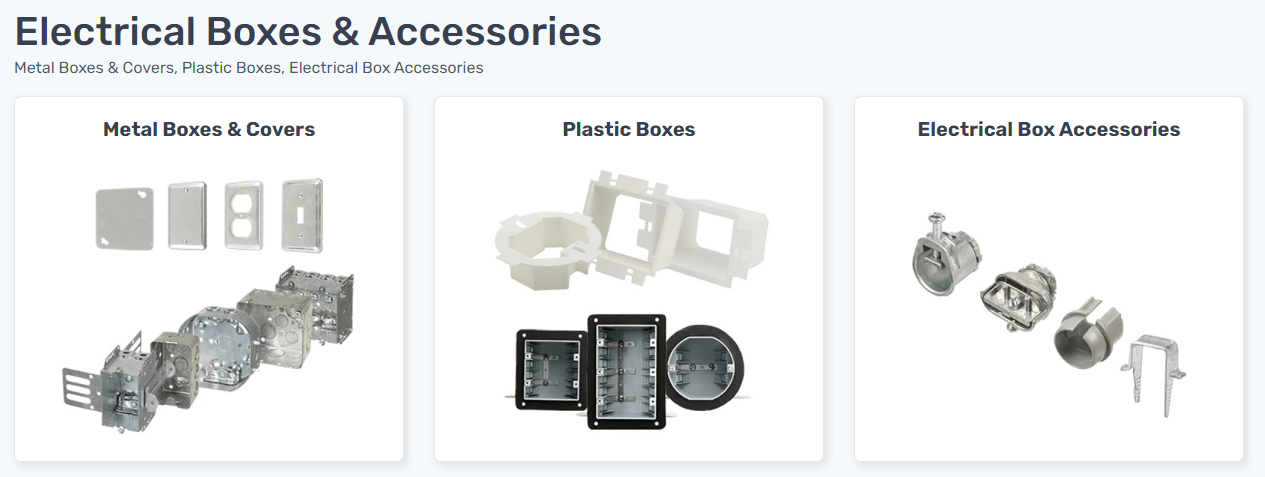Comparing Metal and Plastic Enclosures for Electrical Use
When it comes to electrical installations, choosing the right type of enclosure is crucial for safety and functionality. Metal boxes and plastic boxes are two common options available, each with its own set of advantages and disadvantages. In this blog, we'll explore the pros and cons of both metal and plastic boxes, helping you make an informed decision for your electrical needs. Keep in mind that at Arani.ca, we offer metal, plastic and polycarbonate plastic boxes to meet your preferences!

Metal boxes, typically made of steel or aluminum, have been widely used in electrical installations for many years. Some of the pros associated with metal boxes are as follows:
- Durability: Metal boxes are known for their robustness and durability, making them ideal for demanding environments or areas prone to physical impact.
- Fire Resistance: Metal is inherently fire-resistant, providing an added layer of safety in case of electrical malfunctions or short circuits.
- Electrical Grounding: Metal boxes can be effectively grounded, offering protection against electrical shocks and reducing the risk of electrical fires.
While here are some of the cons associated with metal boxes:
- Conductivity: While metal boxes provide grounding benefits, they also conduct electricity. If not properly installed, there is a risk of accidental contact with live wires or short circuits.
- Weight and Installation Difficulty: Metal boxes tend to be heavier than their plastic counterparts, making them more challenging to install, especially in retrofit applications.
- Corrosion: In humid or corrosive environments, metal boxes may be susceptible to rust or corrosion over time. Regular maintenance and proper sealing are necessary to prevent deterioration.
While metal boxes are very popular, some prefer to use plastic boxes. Plastic boxes, often made of PVC (polyvinyl chloride) or ABS (acrylonitrile butadiene styrene), have gained popularity in recent years due to their affordability and ease of installation. Some of their pros include:
- Non-Conductive: Plastic boxes provide inherent insulation properties, reducing the risk of electrical shocks and short circuits caused by accidental contact with live wires.
- Lightweight and Easy Installation: Plastic boxes are lightweight, making them easier to handle and install, particularly in retrofit scenarios where wall modifications are minimal.
- Corrosion Resistance: Unlike metal, plastic boxes are not susceptible to rust or corrosion, making them suitable for damp or corrosive environments.
While some of their cons include:
- Limited Durability: While plastic boxes are generally durable, they may not withstand heavy impacts or physical stress as well as metal boxes. Care must be taken to avoid damage during installation or maintenance.
- Heat Resistance: Plastic boxes have lower heat resistance compared to metal boxes. If subjected to high temperatures, they may deform or melt, potentially compromising their integrity.
- Limited Grounding: Plastic boxes do not provide inherent grounding capabilities and require additional grounding techniques for electrical safety. This can add complexity to the installation process.
Choosing between metal boxes and plastic boxes for electrical use depends on several factors, including the specific application, environment, and personal preferences. Metal boxes offer durability, fire resistance, and effective grounding, but they can be heavier, more conductive, and prone to corrosion. On the other hand, plastic boxes are lightweight, non-conductive, and corrosion-resistant, but they may lack durability, heat resistance, and inherent grounding capabilities.
Ultimately, it is essential to consult local electrical codes, consider the installation environment, and assess your specific needs before making a decision. In some cases, a combination of metal and plastic boxes might be the most suitable solution. By evaluating the pros and cons of each option, you can make an informed choice that ensures the safety and efficiency of your electrical installations.
Find our metal boxes here: https://www.arani.ca/en/category/metal-boxes-and-covers
Find our plastic boxes here: https://www.arani.ca/en/category/plastic-boxes